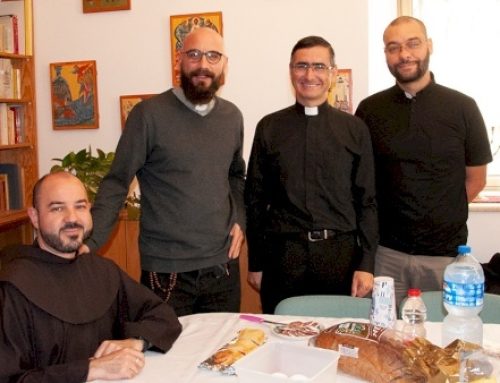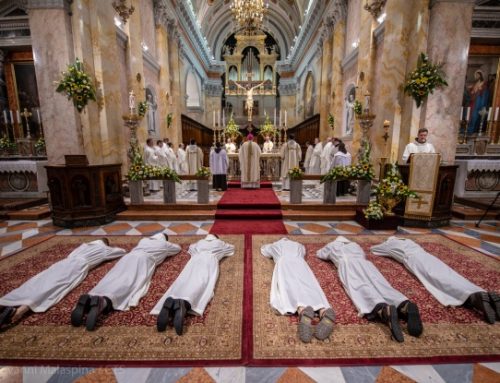“We have to run someone else’s party,” said Rabbi Donniel Hartman. “We are hating them in the name of Judaism,” said Soshi Natan.
JERUSALEM, Dec. 23-Israel is bracing for a flood of Christian tourists and pilgrims for the millennium, in numbers scarcely seen here since the Crusaders clomped into the Holy Land in the Middle Ages.
On the eve of the Big Event, here is how Israelis feel about the 3 million to 4 million people who will be arriving in Israel over the next week or so and throughout the millennial year. According to a Gallup poll conducted earlier this month on behalf of an interfaith organization called the International Fellowship of Christians and Jews:
* Three-quarters of Israelis cannot identify Christmas Day, Dec. 25, as a date of “special significance.”
* Nearly two-thirds do not have a single Christian friend, and three in five have not met any Christians in Israel.
* Just under half either do not care that the pope is planning a trip here in March or are hostile to the idea.
The findings reinforce what observers here have been saying for months–that in the countdown to the millennium and the expected avalanche of Christian visitors, some Israelis are deeply ambivalent. In many ways, Israel–founded 52 years ago as a homeland for Jews fleeing persecution in Christian countries–is unprepared for the 2,000th anniversary of the birth of Jesus, a figure who plays no major role in Judaism.
“We have to run someone else’s party,” said Rabbi Donniel Hartman, a scholar in Jerusalem specializing in Jewish philosophy. “You don’t sense any excitement in official Israel or among Israelis or even awareness of what’s about to take place. One of the biggest stories is a non-story.” Said Ron Kronish, director of Israel’s Interreligious Coordinating Council: “There’s this notion that this is a state for Jews and not for others, and if we allow too much other expression, it won’t be a Jewish state any more.”
The large number of expected visitors has generated practical, logistical problems as well. At Ben-Gurion Airport, hassled passport and customs officials said they are overwhelmed by the crush of arrivals and have appealed for patience until expansion plans are complete this spring.
Elsewhere, authorities dismissed the threat posed by messianic Christians prophesying doomsday scenarios as the new millennium dawns–but they are taking no chances.
In Jerusalem, police are tripling the number of officers on the streets as the new year approaches; nationwide, 20,000 uniformed police, plainclothes men and other security agents will be on duty as 1999 turns to 2000.
Some 400 security cameras have been installed to scan major churches, Muslim holy sites and the narrow alleyways of Jerusalem’s Old City. Special situation rooms have been established by city authorities and national police to coordinate the army and police operations and to respond quickly to transportation and water problems.
But many Israelis, particularly the secular majority, are perfectly happy, if somewhat clueless, about the gentiles heading their way. Jerusalem shopkeepers, restaurateurs and hoteliers are apt pupils of ecumenical commerce. They understand that the millennium will generate a bumper crop of tourists that will far exceed that of any previous year. That will boost the economy and enable the country to strut its stuff as the more or less modern, more or less high-tech society it has become.
“We are excited,” said Jerusalem’s mayor, Ehud Olmert. But among the most religious Israelis, the prospect of hordes of Christians passing through the gates of Ben-Gurion airport is disquieting. In the busloads of eager pilgrims retracing the footsteps of Jesus in Jerusalem, Bethlehem, Nazareth and Galilee, some religious Jews see a fifth column of missionaries and interlopers.
The sense of unease here about so many Christians arriving in Israel is subtle, rooted in centuries of Christian antisemitism and persecution as well as memories of the Holocaust. Some of the most devout Jews fear that Israel may be transformed into what the ultra-Orthodox newspaper Yated Neeman called “a vast center for Christianity” and that pilgrims will “parade their crosses and their sacrilege.”
“Crosses are a symbol of religion and a symbol of the persecution that Jews suffered throughout the centuries,” said Rabbi Mordechai Plaut, editor of the English-language edition of Yated Neeman. “In many ways the cross is more upsetting than a swastika, because of the religious element. . . .
“Some people are thinking of this millennium in terms of the last millennium–the crusades. Remember the march across Europe was over Jewish dead bodies.”
When Western journalists asked a government spokesman, Moshe Fogel, to explain the inhospitable greeting projected by some religious Israelis, he reminded them of the bloodstained history of Jewish suffering at the hands of Christians.
Oddly enough, the interreligious anxiety here has crystallized around a symbol of no particular religious significance–the Christmas tree. In the past few months, the Jerusalem branch of the rabbinate, the country’s highest religious authority, has issued clear instructions forbidding city hotels from displaying Christmas trees in their lobbies. Since the hotels rely on the rabbis’ kosher seals of approval for much of their business, none dares disobey.
Crosses and Christmas trees are offensive to Jews, said Israel’s chief rabbi, Yisrael Meir Lau. “We are not a part of that belief.”
Furthermore, the rabbis have refused to relax Jewish Sabbath rules that forbid music and other festivities involving sound systems on Friday nights. Since Christmas Eve and New Year’s Eve fall on Fridays this year, that means Jerusalem hotels will not be the festive places some tourists might expect.
That has left the hotels in the slightly awkward position of trying to please their Christian guests while also staying in the good graces of the rabbinate. The Hyatt Regency, for instance, has decked out its lobby atrium in silver streamers and colorful balls–but kept its Christmas tree just out of sight, in the ballroom where private events are held.
The rabbinate’s ban on Christmas trees in hotel lobbies has angered some Christian clergymen here. “If we obliged Jewish people in the United States to hide their
Secular and moderate Jews are furious with the hard-line rabbis for the cold shoulder they have shown Christian pilgrims, whom they consider backward-looking. Outside Jerusalem, with its heavy concentration of ultra-religious Jews and its swelling crowds of tourists, there is less anxiety about Christians than about the attitudes of Jewish religious authorities.
“Yes, there have been many who hated us Jews in the name of Christianity,” said Shoshi Natan, a teacher from Tel Aviv. “But that’s over, and now we are doing the same thing: We are hating them in the name of Judaism. That isn’t any better, is it?”



